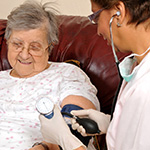Where is Jewish End of Life Care Offered?
Jewish hospice and palliative care services can be delivered in a variety of settings. Based on what is most appropriate to address the patient’s comfort and care needs, hospice arranges for care to be delivered in the right setting. This type of care focuses on treating pain, symptoms and stress of life-limiting illness. The goal of this special type of life care is to ease physical and emotional suffering and improve the quality of life for both the patient and their family.
At Home
For many patients, remaining at home is the ideal choice – it’s comfortable and familiar. The patient can be surrounded by family, friends and pets. Your care team arranges for care to be delivered in the home setting (which may also be a nursing home or assisted living community) and this includes the delivery of any medical equipment required for the patient’s comfort and care.
Jewish Hospice Residences
Sometimes a patient does not wish to remain at home. Other times, remaining at home is not possible because the patient has more intensive support needs than family caregivers can provide. In these cases, Jewish patients can receive vital services at a hospice residence.
A Jewish residence provides Jewish hospice and palliative care services in a setting that provides expert medical care, pain management, emotional and spiritual support and also observes kashrut (Jewish dietary law). Funded in part through generous ongoing support from UJA-Federation of New York, MJHS Hospice Mollie and Jack Zicklin Residence in Riverdale is the only New York State-certified residential hospice established under Jewish auspices. At a Jewish hospice residence, Jewish patients and their families can have the breadth of their religious needs met, even outside of the home.
Hospitals and Inpatient Units
There are times when a patient requires a more intensive level of support than can be provided at home. A patient might receive care at a hospital or inpatient unit (IPU) offering more support for a higher level of acuity or medical needs. There are inpatient units across New York, such as at the IPU at Mount Sinai Beth Israel Medical Center, that provide a general inpatient (GIP) level of care while attending to the Jewish patient’s medical, emotional, spiritual and religious needs.





